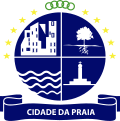| National Library of Cape Verde | |
|---|---|
| Instituto de Biblioteca Nacional e do Livro | |
 | |
 | |
| 14°55′02″N23°30′41″W / 14.9172°N 23.5114°W | |
| Location | Praia, Cape Verde |
| Established | 1999 |
| Collection | |
| Items collected | 30,000 books |
| Legal deposit | yes |
| Other information | |
| Director | Dr. Joaquim Morais |
| Website | www |
The National Library of Cape Verde (Portuguese : Instituto da Biblioteca Nacional e do Livro) is located in Praia, Cape Verde. The library was established in 1999. [1] The library maintains the National Bibliography, contains the country's historical archives and the theses and dissertation bank and is a legal deposit. [2] It also serves as the public library of Praia, the country's capital.

